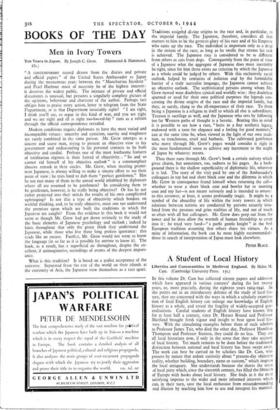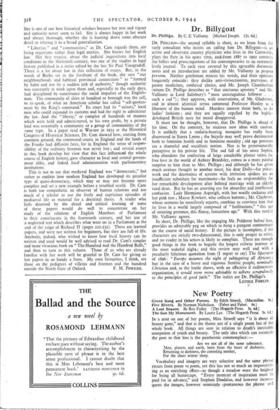A Student of Local History
Liberties and Communities in Medieval England. By Helen M.
Cam. (Cambridge University Press. 15s.) •
IN this volume Dr. Cam has collected sixteen papers and addresses which have appeared in various contexts' during the last twenty years, or, more precisely, during the eighteen years 1924-1942. As she points out in an introductory defence of the study of local his- tory, they are concerned with the ways in which a scholarly examina- tion of local English history can enlarge our knowledge of English history as a whole, and reveal the fragility of widely-accepted gen- eralisations. Careful students of English history have known this for at least half a century, since Dr. Horace Round and Professor Maitland brought fresh vigour and insight to bear upon local his- tory. With the stimulating examples before them of such scholars as Professor James Tait, who died the other day, Professor Hamilton Thompson and Professor Stenton, they could do no less. They are all local historians now, if only in the sense that they take account of local history. Yet much remains to be done before the traditional distinction between national and local history has been swept away. The work can best be carried on by scholars like Dr. Cam, who possess by nature that ardent curiosity about "present-day objective reality, whether building, boundary, name or custom," which inspirci the local antiquary. She understands because she shares the seri,: of local piety which, since the sixteenth century, has filled the librari:1 of Europe with books about local history. She finds in it the mc,t satisfying impetus to the wider and more informed interests which can, in their turn, save the local enthusiast from misunderstanding and illusion by teaching him how to use and interpret his material.
She is one of our best historical scholars because her zest and vigour and curiosity never seem to fail. She is always happy in her work and always thorough, whether she is hunting down some. obscure detail or relating it to a broad generalisation.
"Liberties" and "communities," as Dr. Cam regards them, are living organisms rather than legal entities. She knows her English law. Her first treatise, about the judicial inquisitions into local conditions in the thirteenth century, was one of the studies in legal history published in a series edited by the late Sir Paul Vinogradoff. There is a lot about law in this collection of essays. But, in the words of Burke set in the forefront of the book, she sees "our neighbourhoods and habitual provincial connections" as "formed by habit and not by a sudden jerk of authority," though authority was constantly at work upon them and, especially in the early days, had disciplined by contrivance the social impulses of the English- man. The community of shire or hundred or borough was the cell, so to speak, of what an American scholar has called " self-goVern- ment by the King's command." Its court had its "suitors," 'local men who could expound its customs and had the right to administer the law. And the "liberty," or complex of hundreds or manors which were held and administered, to his own profit, by a private lord was essentially a community or a group of communities of the same type. In a paper read at Warsaw in 1935 at the Historical Congress of Historical Sciences, Dr. Cam showed how, starting from common ground, the communal courts in England and the lands of the Franks had different fates, for in England the sense of respon- sibility of the ordinary freeman was never lost' and several essays in this book develop her view that this fact influenced the whole course of English history, gave character to local and central govern- ment alike, and linked local administration with parliamentary institutions.
This is not to say that medieval England was "democratic," but rather to explain how modern England has developed its peculiar type of quasi-democracy, which may or may not become more complete and set a new example before a troubled world. Dr. Cam is both too sympathetic on observer of human relations and too much of a scholar to use the lively and capricious episodes of mediaeval life as material for a doctrinal thesis. A reader who feels deterred by the detail and critical learning of some of these papers would do well to concentrate on her study of the relations of English Members of Parliament to their constituents in the fourteenth century, and her use of a neglected text which describes what went on in a Parliament at the end of the reign of Richard II (pages 222-235). These are learned papers, and were not written for beginners, but they are full of life. Anybody, indeed, who wished to know how local history can be written and used would be well advised to read Dr. Cam's simpler and more vivacious book on "The Hundred and the Hundred Rolls," and then to turn to this volume. Those of us who are already familiar with her work will be grateful to Dr. Cam for giving us her papers in so handy a form. My own favourites, I think, are those on the pedigrees of villeins and freemen and the hundred outside the North Gate of Oxford. F. M. POWIC:ICE.



























 Previous page
Previous page